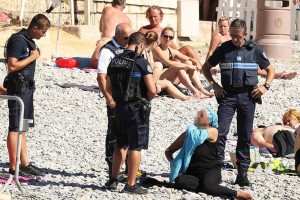I saw a post on facebook comparing what happened recently on a beach in Nice, France, with what happens on beaches in Iran. In Nice, men were forcing women to wear less clothing, whereas in Iran, men were forcing women to wear more clothing. The facebook post alluded that it is time that men stopped telling women what they can and can’t wear.
I hadn’t previously heard about the burkini, so I went looking for more information. I discovered this article which gave one person’s perspective on the issue.
http://www.vox.com/2016/8/25/12623296/france-burkini-ban-explained
I can certainly understand French officials becoming fearful after all that has occurred in their country, and as someone who lives in the relatively safe country of Australia, I am certainly not in any position to judge them. However, I do agree with the writer of this article, when she says that it is likely that such a ban is likely to be very counterproductive.
In Australia, we have long been aware of the detrimental effects of the sun on our skin, and been encouraged to wear clothing on the beach which protects us from the sun. One wonders if Aussies visiting French beaches in their long-sleeve rashies would also be forced to remove them.
The answer comes, however, in the offence for which the woman in Nice was charged: “not wearing an outfit reflecting good morals and secularism”.
The problem is not that the woman covers herself, but that she covers herself in a way that looks Muslim. Have the law-makers in France forgotten the vital two thirds of their country’s motto: “liberté, égalité, fraternité” (liberty, equality, fraternity).
Wikipedia defines liberty and equality thus:
“The Declaration of the Rights of Man and of the Citizen of 1789 defined liberty in Article 4 as follows:
Liberty consists of being able to do anything that does not harm others: thus, the exercise of the natural rights of every man or woman has no bounds other than those that guarantee other members of society the enjoyment of these same rights.
Equality, on the other hand, was defined by the 1789 Declaration in terms of judicial equality and merit-based entry to government (art. 6):
[The law] “must be the same for all, whether it protects or punishes. All citizens, being equal in its eyes, shall be equally eligible to all high offices, public positions and employments, according to their ability, and without other distinction than that of their virtues and talents.””
“Liberty consists of being able to do anything that does not harm others”. Can someone tell me what harm women are doing to others by wearing burkinis on the beach?
[The law] “must be the same for all, whether it protects or punishes”. Are nuns who go to the beach dressed in their habits also charged with an offence, as this would also be an outfit not reflecting secularism? I think not.
It seems that the only part of the motto which remains is “fraternity”, a word whose meaning is a bit harder to pin down, but in Wikipedia, it states that one “form of fraternité was that of the patriotic Church, which identified social link with religious link and based fraternity on Christian brotherhood”.
The fact is that the French culture and its laws have a basis in the patriarchal Catholic Church. It is therefore not surprising that, when fear rears its ugly head, men continue to create laws which are weighted towards “the fraternity” on which their country stands.
Although they have endeavoured to create a secular society, France’s leaders cannot change its history or its basis. This history and this basis affect every decision and every action taken by its leaders who have been raised in French society. Even though it is changing slowly, even the French language has a patriarchal bent.
Going back to the post in facebook which started me thinking about all this, I realised that the male leaders of France and those of Iran are not so very different. They believe that they are protecting their country from a fearful enemy. In France the enemy to be feared is radical Islam, and in Iran it is western secularism.
However, in both cases the enemy is illusive, so instead they have targeted the symbols they can easily see: covered women in France and uncovered women in Iran.
Perhaps it is time for France to redefine itself and its motto of liberté, égalité, and fraternité. Can France become a true symbol of liberty, where even Muslim women are able to do anything that does not harm others, including wear headscarfs and burkinis? Can France become a true symbol of equality, where the law is the same for all, whether they be Catholic nuns or Muslim women? And can France recreate itself, rather than as a fraternity, but as a unity which embraces all people, regardless of their religion or gender?
Perhaps it is time for the leaders of both France and Iran to begin to base their decisions, not on fear, but on its opposite, love. The patriarchal way of doing things doesn’t seem to be working so well any more. Why not try a new way?
French authorities are in a perfect position to begin a new trend in governance which could help spread peace from their country out into the world.
Why not ask Muslim women what they think? I wonder if anyone has thought to ask them what they think might be the solution to the problems which France faces? Could it actually help the situation?
My guess is it couldn’t hurt.
https://en.wikipedia.org/wiki/Libert%C3%A9,_%C3%A9galit%C3%A9,_fraternit%C3%A9
I would love to hear your views.


Leave A Comment